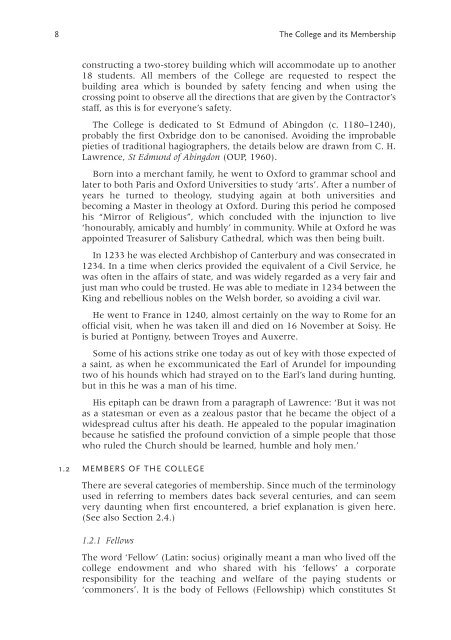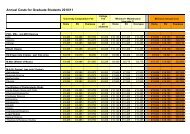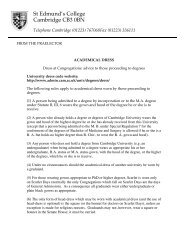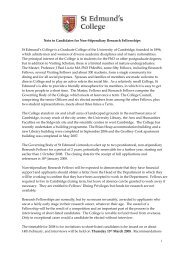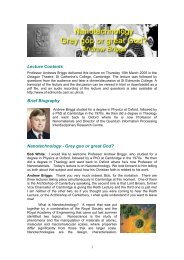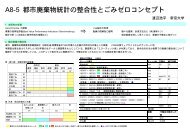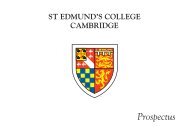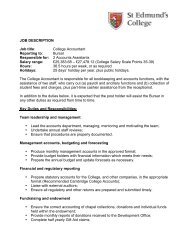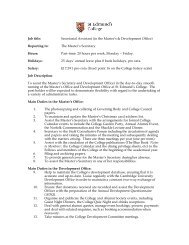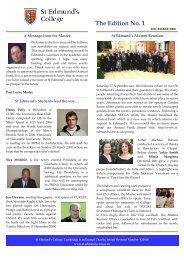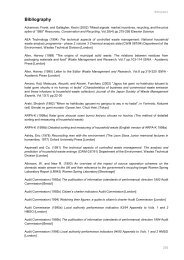Notes for Members 2006â2007 - St Edmund's College - University of ...
Notes for Members 2006â2007 - St Edmund's College - University of ...
Notes for Members 2006â2007 - St Edmund's College - University of ...
Create successful ePaper yourself
Turn your PDF publications into a flip-book with our unique Google optimized e-Paper software.
8 The <strong>College</strong> and its <strong>Members</strong>hip<br />
constructing a two-storey building which will accommodate up to another<br />
18 students. All members <strong>of</strong> the <strong>College</strong> are requested to respect the<br />
building area which is bounded by safety fencing and when using the<br />
crossing point to observe all the directions that are given by the Contractor’s<br />
staff, as this is <strong>for</strong> everyone’s safety.<br />
The <strong>College</strong> is dedicated to <strong>St</strong> Edmund <strong>of</strong> Abingdon (c. 1180–1240),<br />
probably the first Oxbridge don to be canonised. Avoiding the improbable<br />
pieties <strong>of</strong> traditional hagiographers, the details below are drawn from C. H.<br />
Lawrence, <strong>St</strong> Edmund <strong>of</strong> Abingdon (OUP, 1960).<br />
Born into a merchant family, he went to Ox<strong>for</strong>d to grammar school and<br />
later to both Paris and Ox<strong>for</strong>d Universities to study ‘arts’. After a number <strong>of</strong><br />
years he turned to theology, studying again at both universities and<br />
becoming a Master in theology at Ox<strong>for</strong>d. During this period he composed<br />
his ‘‘Mirror <strong>of</strong> Religious’’, which concluded with the injunction to live<br />
‘honourably, amicably and humbly’ in community. While at Ox<strong>for</strong>d he was<br />
appointed Treasurer <strong>of</strong> Salisbury Cathedral, which was then being built.<br />
In 1233 he was elected Archbishop <strong>of</strong> Canterbury and was consecrated in<br />
1234. In a time when clerics provided the equivalent <strong>of</strong> a Civil Service, he<br />
was <strong>of</strong>ten in the affairs <strong>of</strong> state, and was widely regarded as a very fair and<br />
just man who could be trusted. He was able to mediate in 1234 between the<br />
King and rebellious nobles on the Welsh border, so avoiding a civil war.<br />
He went to France in 1240, almost certainly on the way to Rome <strong>for</strong> an<br />
<strong>of</strong>ficial visit, when he was taken ill and died on 16 November at Soisy. He<br />
is buried at Pontigny, between Troyes and Auxerre.<br />
Some <strong>of</strong> his actions strike one today as out <strong>of</strong> key with those expected <strong>of</strong><br />
a saint, as when he excommunicated the Earl <strong>of</strong> Arundel <strong>for</strong> impounding<br />
two <strong>of</strong> his hounds which had strayed on to the Earl’s land during hunting,<br />
but in this he was a man <strong>of</strong> his time.<br />
His epitaph can be drawn from a paragraph <strong>of</strong> Lawrence: ‘But it was not<br />
as a statesman or even as a zealous pastor that he became the object <strong>of</strong> a<br />
widespread cultus after his death. He appealed to the popular imagination<br />
because he satisfied the pr<strong>of</strong>ound conviction <strong>of</strong> a simple people that those<br />
who ruled the Church should be learned, humble and holy men.’<br />
1.2 MEMBERS OF THE COLLEGE<br />
There are several categories <strong>of</strong> membership. Since much <strong>of</strong> the terminology<br />
used in referring to members dates back several centuries, and can seem<br />
very daunting when first encountered, a brief explanation is given here.<br />
(See also Section 2.4.)<br />
1.2.1 Fellows<br />
The word ‘Fellow’ (Latin: socius) originally meant a man who lived <strong>of</strong>f the<br />
college endowment and who shared with his ‘fellows’ a corporate<br />
responsibility <strong>for</strong> the teaching and welfare <strong>of</strong> the paying students or<br />
‘commoners’. It is the body <strong>of</strong> Fellows (Fellowship) which constitutes <strong>St</strong>


